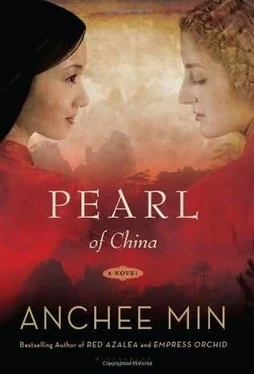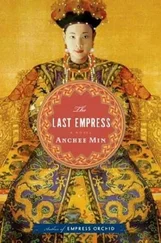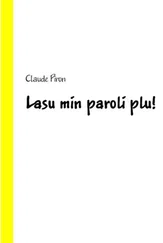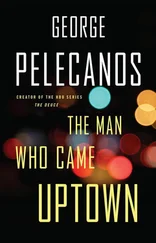“Farewell!” the crowd on the pier cried.
One wife shouted at her husband affectionately, “Hey, you idiot and soon-to-be-beheaded. Don’t forget to save firewood after lighting the stove!”
The husband laughed and yelled back, “Hey, dumb wrinkleface, you’d better remember to come home or you will find me spending all your savings on a concubine!”
I wept, wishing that my arms were around Pearl. By leaving I meant to escape my own misery, but I had ended up punishing her.
The departure would preserve what we had, I hoped.
Yet could I truly leave?
The water gap between us widened. People screamed back and forth in a contest of comic insults.
Then, in a Chin-kiang tone, I heard Pearl yell, “I am not a bird but a mosquito-too tiny for you to use a rifle on!”
Knowing I was forgiven, I shot back, “Be careful when you think that you have gotten a good deal. Check on your handsome rooster. Don’t be surprised if he grows a set of teeth one day!”
“Go ahead and cartwheel on the back of a bull! I am a loyal admirer!”
“Yeah, the fox comes and cries at the chicken’s funeral. Go away!”
I wasn’t sure whether it was my door or the neighbors’ when I heard the knocking. The attic room where I lived was near the Shanghai waterfront, the Bund. At night I could hear porters at work and the sighing sound of passing ships. I tried to go back to sleep but the knocking grew louder. I realized that it was my door. I glanced at the clock. It was four in the morning.
“ Willow!” came Dick’s voice.
I went to open the door.
The expression on Dick’s face scared me. His eyes were red and swollen, as if he’d been crying.
“What’s wrong?” I asked.
Dick handed me a stack of newspapers.
I glanced at the headlines and staggered back in shock.
POET DIES IN PLANE CRASH!
HSU CHIH-MO’S PASSING AT 34 STUNS THE NATION!
POSTAL PLANE CRASHES NEAR NANKING, PILOT AND PASSENGER. NONE SURVIVE.
I recognized the words, but my mind refused to acknowledge their meanings. I kept flipping the newspapers back and forth. The date was correct, November 20, 1931. Hsu Chih-mo’s face was on every front page. I looked at him, the handsome smiling face, the leaf-shaped gentle eyes and the silky black hair. The classic good looks of a northerner. I touched the image of his face with my fingers. My tears smeared the ink.
Dick held my shoulders and sobbed like a child. “Did you know about him taking free rides on postal airplanes?” he asked.
Of course I knew. Hsu Chih-mo had been in touch with me because Pearl had again been refusing to see him. Pearl wanted to end their affair. Hsu Chih-mo figured it was because he was still a married man. He returned to Shanghai and asked for a divorce from his wife. But his wife wouldn’t release him without an impossible monetary settlement. To make money, Hsu Chih-mo accepted lecture invitations all over the country. He traveled every few days from city to city. He was also teaching part-time at both Shanghai University and Peking University. He was offered free airplane rides by a friend, a postal pilot. Hsu Chih-mo was grateful to save the money. The friend also flew Hsu Chih-mo to Nanking to meet Pearl in secrecy.
“Once bitten by a snake, forever in fear of ropes,” Hsu Chih-mo once said about Pearl ’s anxiety about a new marriage.
“Isn’t it enough that you are lovers?” I asked.
“No.” His voice was soft but determined. “I’d like to spend the rest of my life with her.”
The expression on Hsu Chih-mo’s face was still vivid in my mind. He had sat on the chair in my attic. When he stood, his head touched the ceiling. He hunched to make himself fit. Behind him, beyond an open window, was a sea of Shanghai rooftops.
Pearl would learn the news in the next few hours. She would discover her lover’s death at the breakfast table, perhaps. Carol wouldn’t notice her mother’s shock, and the servant wouldn’t know where the mistress’s tears sprang from.
I hadn’t told Pearl about Hsu Chih-mo’s last visit. He had been upset and angry at me for supporting Pearl ’s decision.
In the past, their separations had never lasted. It was like cutting water with a sword. They simply couldn’t resist each other. Hsu Chih-mo took the free plane ride three times a week to be with her. I learned from Hsu Chih-mo that the pilot let him borrow his farmhouse near the airport. Pearl described to me her visits to the farmhouse.
“I was like an addict running toward opium,” she said of her meetings with Hsu Chih-mo.
I kept finding out new details about the plane crash. On the day of the accident the weather was foggy. The pilot misjudged. The plane hit the mountaintop and crashed. One source said that the pilot often got absorbed in conversation with Hsu Chih-mo. They thought the accident might have taken place because the pilot was distracted.
The papers said that Hsu Chih-mo’s wife was so heartbroken that she vowed to quit opium. She declared to the public that she would devote her life to publishing all Hsu Chih-mo’s remaining work and letters.
Hsu Chih-mo’s funeral was held in Nanking.
I asked Dick, “Why not Peking? Why not Shanghai?”
“It was Hsu Chih-mo’s wish,” Dick replied. “He wanted his ashes to be scattered over the Purple Mountain and the Yangtze River.”
Had Hsu Chih-mo anticipated the possibility of his crash? I was astonished at the thought. Certainly the poet had had an active imagination. It wouldn’t have been unthinkable for him to have entertained the idea of a dramatic exit.
I remembered Hsu Chih-mo’s description of his last falling-out with Pearl. He visited me after days of drinking and sleepless nights. In fact, it was two days before he took the fatal flight.
“Will you give this to her?” he asked, holding out a package.
“She told you that this had to stop,” I responded.
“It will be the last time that I impose on you.”
“What is it?”
“My new book, a collection of poems.”
I gave him a she-won’t-read-it look.
“I don’t care. She inspired it.”
Mourners filled the streets of Nanking. White magnolias and jasmine were sold out. Dick and I had taken a train from Shanghai to Nanking. We arrived in the afternoon. Dick had sent Pearl a message before we left but received no response.
The Nanking crematorium was covered with white flowers. A photo of Hsu Chih-mo on the wall greeted the visitors. A banner that ran the length of the hall read, people’s poet rests in peace. Beyond the flower wreath was the closed casket. Dick had seen his friend’s body and said that Hsu Chih-mo would have wanted the lid closed.
No one in Pearl ’s house knew where she was. The maid said that her mistress had gone to the university. Eventually I thought of the pilot’s farmhouse.
I only had Pearl ’s vague description of the place, but I told Dick that I would look for her. Once outside the city, I was lost. It was a peasant child who pointed me in the right direction. The child had seen an airplane landing and taking off at an abandoned World War I-era military airport near the house. The spot was cradled by the surrounding hills. Waist-tall weeds grew in patches across the cracked runway.
The farmhouse was covered with wild ivy. Frogs and crickets ceased their singing as I walked to the door. Grasshoppers jumped over my feet, and one almost got into my mouth. Giant mosquitoes buzzed around my head.
The door was ready to fall from its hinges. It leaned to one side and was open. I let myself in. Once inside, I smelled the incense.
She was in an ocean-blue Chinese dress, embroidered with white chrysanthemums, the symbol of grief. She was on her knees lighting incense. She had been performing the traditional Chinese soul-guarding ceremony for Hsu Chih-mo. She had set up an altar with flowers and water.
Читать дальше












